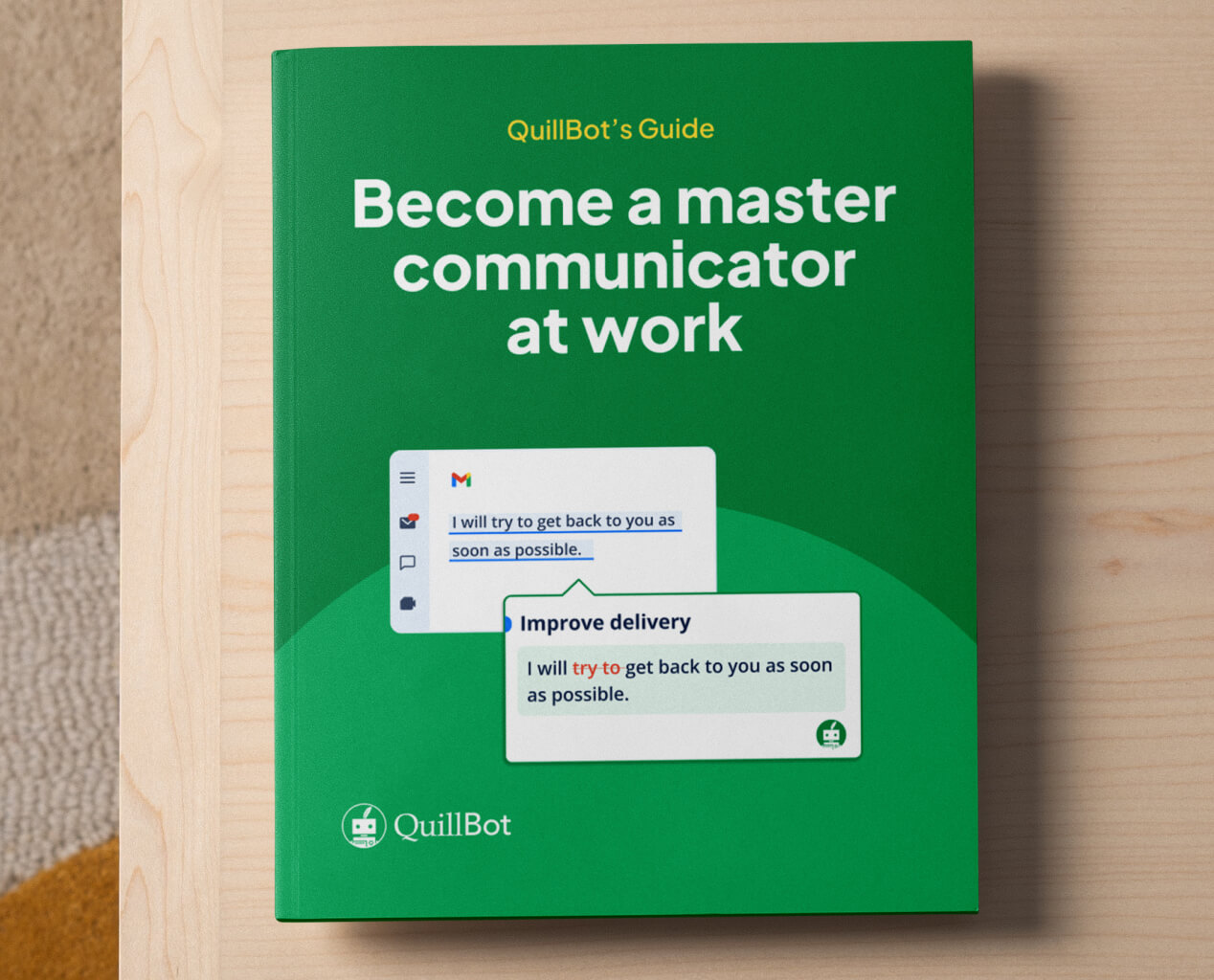Transition Words & Phrases | List & Examples
Transition words and phrases are used to connect ideas in your writing and help readers understand your arguments. Also called connecting words, linking words, transitional words, or sentence starters (when used at the beginning of a sentence), these words describe the relationship between phrases, sentences, or paragraphs.
Understanding and using transition words effectively is necessary to produce clear and cohesive writing. Using a paraphraser like QuillBot’s can help you integrate transition words into your writing.
Transition words for essays
Transition words can be divided into four categories: sequential, additive, causal, and adversative. These four categories can be further subdivided into more specific functions.
Sequential transition words
Sequential transition words can be used to indicate the order you’re presenting ideas in your essay or an order of events. They are often used in academic writing to orient the reader to the text.
Transition words for initiation
Words and phrases to introduce “what happened first” include:
- First of all
- To begin with
- Initially
- In the first place
- At first
Transition words for enumeration
You can use these words and phrases to list or order your points:
- First/second/third, etc.
- Finally
- Firstly/secondly/thirdly, etc.
- Lastly
- As a final point
Transition words for continuation
Words to order steps in a sequence or process include:
- Next
- Subsequently
- Before X
- After X
- Then
- Previously
- Eventually
- Afterward
Transition words for resumption
You can use these phrases to signal that you’re coming back to a previous point:
- returning to/to return to
- to resume
- at any rate
- as previously stated/mentioned
Transition words for summation
These words and phrases show that you’re going to make a summary or conclusion:
- In summary
- Overall
- In conclusion
- Altogether
- In sum
- To summarize
Additive transition words
You can use additive transition words to introduce examples or new details. They add to, clarify, or make a comparison with previous text.
Transition words for examples and illustrations
The following transition words introduce examples or highlight specific cases:
- For example
- For instance
- Such as
- Like
- Including
- Particularly
- In particular
- Especially
Transition words for addition
These words and phrases show that you are adding or reinforcing a point:
- Additionally
- Moreover
- Furthermore
- Also
- Both x and y
- Not only x but also y
Transition words for similarity
You can use the following transition words and phrases to point out similarities or make comparisons:
- Likewise
- Similarly
- In the same way
- Equally
Transition words for reference
These words and phrases signal the topic or subject you’re about to address:
- In regard to x,
- Considering x,
- On the subject of x,
- Concerning x
Transition words for clarification
Words and phrases to introduce a clarification or further explanation include:
- Namely
- Specifically
- That is (to say)
- In other words
- More precisely
Transition words for emphasis
You can use these words and phrases to emphasize a point you’re making:
- Indeed
- Above all
- More/most importantly
- In fact
Causal transition words
You can use causal transition words to describe causes and effects.
Transition words for condition
These words and phrases introduce a condition:
- Provided that
- On the condition that
- (Even/only) if/when
- As long as
- In the event that
- Inasmuch as
- In case
Transition words for consequence
The following words signal that you’re pointing out a consequence:
- Hence
- Thus
- Consequently
- Therefore
Transition words for purpose
You can use these words and phrases to explain a purpose:
- In order to/that
- So that
- For the purpose of
- With this in mind
Adversative transition words
You can use adversative transition words to indicate a contrast or disagreement with what has come previously.
You can use adversative transition words to indicate a contrast or disagreement with what has come previously.
Transition words for conflict
These words and phrases introduce a contrast or contradiction between two ideas:
- However
- But
- Although
- While
- On the other hand
- In contrast
- Whereas
- Conversely
- Though
Transition words for dismissal
These words and phrases downplay the importance of a previous point, indicating that it does not affect the overall argument.
- Whatever the case
- Regardless
- Either way
- In any event/in either event
- All the same
- At any rate
Transition words for concession
You can use these words and phrases to show that you accept a fact or point, but this doesn’t change your argument:
- Nonetheless
- Nevertheless
- Even so
- Despite x
- Notwithstanding x
- Regardless (of x)
- In spite of x
- Admittedly
- Though
Transition words for replacement
Here are some words and phrases to adjust what you’ve just said or offer an alternative:
- (Or) rather
- (Or) at least
- Instead
- If not
- Or (perhaps) even
These lists of transitions are adapted from those created by Prof. Campbell, Prof. Buckhoff, and Prof. Dowell at Michigan State University under a Creative Commons license.
How to use transition words effectively
Often, transition words are used to begin a new sentence or clause. They show how the sentence relates to the previous one.
Transition words can also be used in the middle of a clause. When used in this way, you need to pay careful attention to placement.
Example paragraph with and without transition words
The text below contains all of the necessary facts, but it lacks any transition words. This makes it difficult to determine what the connection is between the sentences and what point the writer is trying to make.
Don’t overuse transition words
It is possible to overdo transition words. Not every clause needs an explicit transition. In the example below, the repetition of the same type of linking word feels repetitive.
In this example, it makes the most sense to combine sentences so that fewer linking words are required.
Effective use of transition words involves finding the right balance. Too few transition words can mean a text is difficult to follow, but too many can seem unnatural.
Common mistakes with transition words
It is easy to make mistakes with transition words and phrases because they often have subtle differences in meaning and grammatical function.
Using transition words incorrectly means that your audience won’t be able to follow your arguments. Identifying some of the more common mistakes can help you be aware of them in your writing.
Creating sentence fragments
Some transition words (e.g., “if,” “because,” “although”) are subordinating conjunctions. They are used to begin dependent clauses, which cannot stand on their own as sentences.
Clauses that start with these words must be attached to an independent clause. When they’re not, they are considered a sentence fragment.
- We excluded the results from people over age 65 from the analysis. Because there were only two people in this age bracket.
It can be fixed by connecting the dependent clause to the independent clause. The dependent clause can come before or after the independent clause.
- We excluded the results from people over age 65 from the analysis because there were only two people in this age bracket.
- Because there were only two people over age 65, we excluded their results from the analysis.
Beginning a sentence with and, so, or also
In academic writing, the words “and,” “so,” and “also” are not used to begin sentences because they are considered too informal.
- Also, respondents filled out a Likert scale questionnaire.
This can be fixed by moving the transition word or by using a more formal transition word.
- Respondents also filled out a Likert scale questionnaire.
- Additionally, respondents filled out a Likert scale questionnaire.
Misuse of therefore
“Therefore” and other causal transition words are used when something follows logically, or is the result of, what has come before. People often misuse “therefore” when there is no cause-and-effect relationship.
- We asked participants to log the number of minutes of exercise they did each day. Therefore, the average amount of exercise per day was 23 minutes.
This example is illogical because it implies that the average amount of exercise is a result of participants being asked to log their exercise, which is false. In this case, we can delete “therefore” to make the sentence logical.
- We asked participants to log the number of minutes of exercise they did each day. The average amount of exercise per day was 23 minutes.
Frequently asked questions about transition words
- What are good transition words for conclusions?
-
Good transition words and phrases for conclusions include:
- To conclude (with)
- Finally
- At last
- As a final point
- In conclusion
- Lastly
- In sum
- Overall
The transition you choose will depend on the level of formality of your text and the argument you have made.
Using QuillBot’s Paraphrasing Tool can help you vary your word choice.
- What are good transition words to start a paragraph?
-
Good transition words and phrases to start a paragraph depend on the purpose of the paragraph and how it relates to the previous one.
Transition words to start a paragraph Function of paragraph Transition word examples Introducing a point to begin with, first of all, first (or second or third) Building on a previous point furthermore, to illustrate, considering x, on the subject of x, similarly, consequently, returning to x Contrasting with a previous point however, in contrast, on the other hand QuillBot’s free AI paragraph generator makes starting paragraphs easy. Simply give it a prompt, and it will instantly craft a well-structured paragraph. Or, you can input paragraphs you’ve already written an ask the tool to suggest appropriate transitions.
- What are good transition words to show contrast?
-
Good transition words and phrases to show contrast include:
- However
- Although
- In contrast
- Conversely
- Whereas
- On the other hand
- While
The transition you choose will depend on the level of formality of your text and your sentence structure.
QuillBot’s Paraphraser can help you vary your word choice.
- What are good transition words for essays?
-
Some good transition words and phrases for essays include “first (of all),” “initially,” “to begin with,” “for example,” “in particular,” “conversely,” “in summary,” “overall,” and “finally.”
QuillBot’s free paraphrasing tool can help you add variety to the transition words you use in your writing.
- What are good transition words for the first body paragraph in an essay?
-
Good transition words and phrases for the first body paragraph in an essay include:
- To begin with
- First
- Initially
- First of all
- Considering x
- On the subject of x
QuillBot’s free paraphrasing tool can help you find options for transition words.
Sources in this article
We encourage the use of reliable sources in all types of writing. You can cite this article using the button or explore the sources we used below.
This Quillbot articleAnderson Hewitt, K. (2025, September 24). Transition Words & Phrases | List & Examples. Quillbot. Retrieved January 7, 2026, from https://quillbot.com/blog/sentence-and-word-structure/transition-words/

